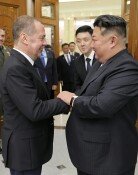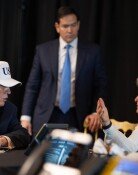The Current Situation of President Roh`s Aides
The Current Situation of President Roh`s Aides
Posted June. 04, 2005 06:44,
Prime Minister Lee Hae-chan recently warned of "a possible domination of [presidential] aides and private organizations. In response, Rep. Yeom Dong-yeon, President Roh`s aide and member of the ruling Uri Party`s Standing Central Committee (SCC), beat back, saying, "What on earth is wrong with [presidential] aides?" Against such a backdrop, President Roh`s aides and private organizations are grabbing public attention again.
At a time when President Roh is headed toward the second half of his term, at issue in the political circles are what his aides are currently doing and what this "possible domination," as the prime minister puts it, means.
Lee Kwang-jae Standing Firmly on the Top?-
Members of the Administrative Institute on Local Autonomy (AILA), which was launched by President Roh in the early 1990s, are the most representative group of presidential aides. Among them, Rep. Lee Kwang-jae of the Uri Party and Ahn Hee-jeong are the closest to President Roh, widely considered his "left arm" and "right arm."
Kim Doo-gwan, presidential special advisor for political affairs and former minister of government administration and home affairs, has also been a member of the AILA. Kim Byung-jun, chief presidential secretary for national policy, once served as the head of the institute.
Rep. Yeom Dong-yeon, who directly retorted back to Prime Minister Lee, became acquainted with President Roh in 2000 when he joined Roh`s primary election camp. Uri Party lawmaker Seo Gap-won and Cheon Ho-sun, head of the Presidential Watch Office on State Affairs (PWOSA), were researchers at the institute.
Their current relationships, however, are no longer like their previous ones. Some speculate young AILA members leaned toward Rep. Lee Kwang-jae while Ahn Hee-jeong was serving his term in prison. They also say that the relationship between Lee and Ahn has recently turned sour.
Some even indicate that many of ruling party members recently involved in various scandals are close to Rep. Lee Kwang-jae. Park Nam-chun, presidential secretary for personnel who was involved in suspicions over the development of Russian oil fields, had served under Lee when he was the head of the PWOSA. Moon Jeong-in, former chairman of the Presidential Committee on the Northeast Asian Cooperation Initiative (PCNACI) who intervened in the Haengdam Island development project, is known to be quite close to Lee.
Presidential Aides from Busan-
This group consists of those who became familiar with President Roh in Busan, his political base. Moon Jae-in, presidential senior secretary for civil affairs who worked as lawyer along with the president, was appointed to the same position right after the launch of the administration and again last January.
Lee Ho-cheol, former student activist who was arrested in the "Boorim scandal" in 1981, came back to the presidential office last January and became the presidential secretary for institutional innovation.
Members of the "386 Group," such as Presidential Vice-Spokesman Choi In-ho and Prime Ministerial Second Secretary for Civil Affairs Jeong Yoon-jae, are the best-known members of this group. Father Song Gi-in, founding member of the Catholic Priests Association for Justice (CPAJ), is regarded as their spiritual mentor.
The group has not been involved in any particular scandals, but some sources say that they frequently have trouble with the party over how to deal with current issues, such as giving a special pardon to politicians, as they are highly inclined to principlism.
Congress for Promotion of National Integration (CPNI)-
Members of this group are those who became acquainted with President Roh in political circles. When former President Kim Dae-jung came back to the political scene by creating the National Congress for New Politics (NCNP) after the 1995 local elections, they resisted that decision and stayed in the Democratic Party. In the 15th general elections the following year, however, most of them failed to be elected.
The most distinguished members of this group include National Assembly Speaker Kim Won-ki and Uri Party lawmakers Yoo In-tae (former senior presidential secretary for political affairs) and Won Hye-young.
Lee Kang-cheol, senior presidential secretary for civil and social affairs who suffered a defeat in last year`s general elections, carefully considers running for the upcoming by-elections in October.
After losing the general elections in 1996, President Roh gathered non-parliamentary district leaders of the Democratic Party and created the "Sunday Society," to which Lee Kang-cheol belonged. Uri Party`s Rep. Cho Kyung-tae was also a member of the Sunday Society.
A considerable number of CPNI and Sunday Society members, most of whom are politicians, are still not on any particular governmental posts. Sources say, however, that some of them are involved in scandals as they engage in a wide range of political activities.
Nosamo members-
Among the President`s close aides are members of "People Who Love Roh Moo-hyun (Nosamo)." Lee Gi-myung, who headed a group of President Roh`s financial supporters, led Nosamo by posting frequent messages on its homepage. Lee, however, was involved in suspicions over the Russian oil field development project and underwent the prosecution`s investigations.
Myeong Gye-nam once was the leader of Nosamo, and Lee Sang-ho, head of Uri Party`s youth committee, took a leading role in online political debates using the pen name, "Mickey Rourke." Some Nosamo members, including Myung, established the People Participation Power (PPP) last January. Lee Gi-myung was nominated as PPP`s standing advisor.
Yeon-WookJung jyw11@donga.com







